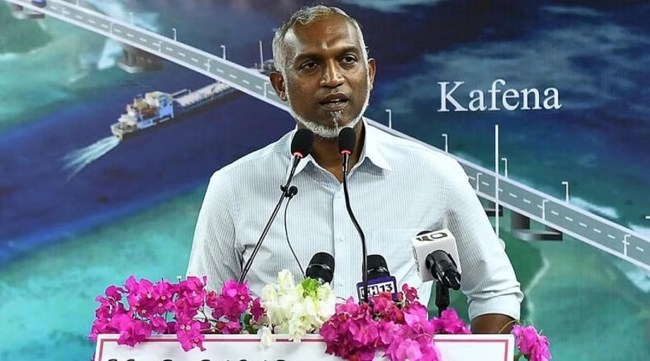Opinion With Israel-Hamas conflict, Maldives President-elect Miuzzu cannot be too ‘pro-China’
Amid escalating rivalry in the Indo-Pacific region, it will not be reasonable for Muizzu to draw his foreign policy lessons from Yameen. Muizzu may not like de-linking entirely from Solih’s foreign policy
 Due to serial protests by opposition parties under the “India Out” campaign, it was obvious that India-Maldives ties would be an issue in the presidential election. During his campaign, Muizzu was critical of the relations between the two countries. (AFP)
Due to serial protests by opposition parties under the “India Out” campaign, it was obvious that India-Maldives ties would be an issue in the presidential election. During his campaign, Muizzu was critical of the relations between the two countries. (AFP) As soon as the Progressive Party of Maldives (PPM)-People’s National Congress (PNC) candidate Mohamed Muizzu began leading in the first round of elections and then in the run-off, global media was flooded with reports projecting the President-elect as a “pro-China” leader. Some reports also see Muizzu’s win as a blow to India’s influence in the Maldives.
Due to serial protests by opposition parties under the “India Out” campaign, it was obvious that India-Maldives ties would be an issue in the presidential election. During his campaign, Muizzu was critical of the relations between the two countries. The outgoing President Ibrahim Mohamed Solih has reiterated that Indian military’s presence in the Maldives was only to build a dockyard under the bilateral agreement and his country’s sovereignty has not been compromised. The exact number of Indian military personnel in the Maldives is unknown. However, it is maintained that 75 Indian military personnel are stationed in the Maldives to operate the Dornier aircraft and two helicopters gifted by India. They also assist in rescuing people stranded or faced with calamities at sea.
After his election, Muizzu reiterated his pledge to withdraw foreign military personnel stationed in the Maldives. He said that the withdrawal would be done according to established rules. Contrary to his election campaign, when he mentioned the presence of Indian military personnel in the Maldives, Muizzu did not name any specific country. Also, in an interview, PNC’s Vice President, Mohamed Hussain Shareef (Mundhu) said that Muizzu would continue the political tradition of choosing New Delhi as his first foreign capital to visit. He said all projects would be honoured, and that “all the fear-mongering about China is unwarranted.”
Nevertheless, with Muizzu in power, India’s influence in the island country will not be the same as it was during Solih’s term. But Beijing is also not going to enjoy the privileged position it had during the presidential tenure of Abdulla Yameen (2013-2018). In these changing times, escalating tensions between the QUAD members and China in the Indo-Pacific region have increased the geostrategic significance of the Maldives. For the USA, Maldives is a “critical partner in the Indo-Pacific region”. In 2020, the USA and Maldives entered into a defence deal. Since 2021, the Maldives National Defence Force and the US Military have been conducting joint military training exercises. In April 2022, the Maldives signed a State Partnership Programme with the USA to build “capacity “and “readiness” of the Maldives’ Defence sector. In June 2023, Maldives re-opened its embassy in Washington DC. In September 2023, Hugo Yon became the “first fully dedicated” US Ambassador to the Maldives. A few weeks before Yon, David Jessup took up his job as the first resident High Commissioner of Australia to the Maldives. In May 2023, during the visit of Maldivian Foreign Minister Abdulla Shahid to Japan, Japanese Foreign Minister Hayashi Yoshimasa explained to him the new plan for a “Free and Open Indo-Pacific”, announced in March this year. They agreed to promote and strengthen cooperation for a free and open international order based on the rule of law. After the presidential election, the United Kingdom’s Ambassador to Maldives, Caron Röhsler, was the first to meet Muizzu. The Indian and Chinese ambassadors followed.
Yameen was also very close to Saudi Arabia. Following Riyadh, under Yameen, the Maldives severed its diplomatic relationship with Iran in 2016 and Qatar in 2017. In January 2021, Maldives announced the reinstatement of its ties with Qatar, and in September 2023, Male reaffirmed that it would restore ties with Tehran. Saudi Arabia has close relations with both Beijing and New Delhi. In February 2023, China broke diplomatic ice between Saudi Arabia and Iran. Saudi Arabia is an important political and economic partner of India. It is vital to the India-Middle East Economic Corridor (IMEEC) success. A Memorandum of Understanding to develop the IMEEC was signed during the meeting of G20 countries in New Delhi in September 2023. During his meeting with the Saudi Ambassador to Maldives, Matrek Abdullah Al-Ajalin Aldosari, Muizzu expressed his desire to strengthen ties with Islamic nations further. However, new differences have emerged in the Islamic world. Saudi Arabia and Israel were ready to sign a deal to normalise their ties, but the ongoing confrontation between Tel Aviv and the Palestinian militant group Hamas has delayed it, and everything is on pause now. The US continues pushing for the Israel-Saudi deal. In such a situation, Maldives must navigate cautiously, considering its larger and long-term interests.
In a fast-changing global situation and amid escalating rivalry in the Indo-Pacific region, it will not be reasonable for Muizzu to draw his foreign policy lessons from Yameen’s tenure. In the island nation’s interests, Muizzu may not like de-linking entirely from the foreign policy Solih practiced. It is convenient to brand Muizzu as a “pro-China” leader, but it is tough for Male to pursue policies favouring China too much. However, under Muizzu, Beijing may have more advantages than other countries.
The writer is research fellow at Institute of South Asian Studies, National University of Singapore





